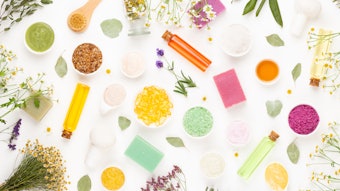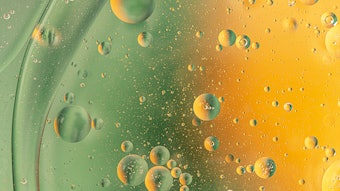Editor's note: This is the edited version of an article that originally ran in the November 2012 issue of Skin Inc. magazine. All rights reserved.
Antioxidants work to prevent damage to the body before it actually happens. They protect and nurture cells naturally, combating disease and promoting good health. Antioxidants come in many forms, including minerals, enzymes and vitamins. Vitamins and minerals with antioxidant properties are called nutrient antioxidants. The family of naturally formed components protects cells from free radicals, which are highly charged oxygen molecules with unpaired electrons that attempt to obtain electrons from other molecules.
Free radicals are formed naturally in the body, but their production is increased by factors such as smoking, sun damage, stress and toxins like air pollution and asbestos. The resulting damage diminishes the skin’s structural support and decreases its elasticity, resilience and suppleness, leads to inflammation, and is the source of liver spots and poor skin condition. In addition to being the main culprit of wrinkles, free radicals, in essence, accelerate the aging process. Studies have shown antioxidants stop this cellular chain reaction of oxidation by neutralizing free radicals.1
Vitamin Power
Antioxidants can improve cell function, increase collagen production, improve elasticity, create healthier, younger skin cells, and reduce sun damage—but the improvement takes time. Like a healthy diet, the more potent the antioxidants used, the healthier the results. Black currants, cherries, cantaloupe, grapes, blueberries, blackberries, cranberries, peppers and spinach are among a growing variety of foods found to contain surprisingly high levels of disease-fighting antioxidant compounds, according to a U.S. Department of Agriculture (USDA) study published in the Journal of Agricultural and Food Chemistry in 2004. This study is one of the largest, most comprehensive analyses to date of the antioxidant content of commonly consumed foods.
As an ultimate superfruit, the grape’s abundance of polyphenols with antioxidant and anti-inflammatory properties not only keeps blood vessels resilient, but also boosts the skin and body’s resistance against disease. Researchers have found, in particular, that the skin and seeds of grapes contain large concentrations of compounds that have a positive effect on health, such as bioflavonoids, including quercetin, which has an antioxidant and anti-inflammatory effect, and oligomeric proanthocyanidins (OPCs), incredibly effective chemicals in neutralizing free radicals.2 OPCs are a special family of polyphenols (bioflavonoids) capable of renewing the most important building blocks—such as collagen and elastin fibers—of every part of the human body, including the skin. In the connective tissue, OPCs bind to collagen to maintain and even restore the cross-links, hence the flexibility of these essential proteins.2 Grape seeds are one of the richest known sources of OPCs. Red grapes also contain a natural plant antibody, resveratrol, which has the effects of an antioxidant.
Vitamin E is a high-potency antioxidant that helps improve circulation and repair tissue, and is one of the most efficient chain-breaking antioxidants available. It helps prevent cell damage by inhibiting the formation of free radicals. Vitamin E helps retard aging and may help prevent age spots. Alpha-tocopherol, a form of vitamin E, helps protect enzymes, such as glutathione peroxidase 4, which is known to act against cancerous cell activity.3 Alpha-tocopherol is the most common antioxidant source from food. Some of the natural sources of vitamin E are nut oils, corn oil, tomatoes, spinach and peppers.
In addition to helping fortify cells against free radicals, vitamins A and C also encourage cell and tissue growth, helping the body to repair itself. Vitamin C is a potent antioxidant that plays a major role in many physical functions, including collagen production, immune function, cell growth and cancer prevention. One of the most potent natural sources of vitamin C is rose hips, and carrots are a primary source for vitamin A.
Topical Care
Antioxidants can come from healthy eating, but only a small percentage of consumed antioxidants actually reach the skin, because they primarily act internally in the body. However, products containing antioxidants can be used to directly affect the skin.4 Antioxidants can be found in everything from masks, moisturizers and cleansers to anti-wrinkle and anti-aging creams, serums and lotions. Topical applications should contain a potent assortment of stable antioxidants to interrupt free-radical damage.
Effective antioxidants for the skin range from green tea, grape extract or vitamin C to idebenone, epigallocatechin-3-gallate (EGCG) or superoxide dismutase. Certain phytochemicals, such as lycopenes and anthocyanins, and zoochemicals, such as conjugated linoleic acid, are called non-nutrient antioxidants. Selenium, copper and zinc are some of the most common antioxidant minerals. They can be absorbed by plants and can appear as micronutrients in botanical ingredients grown in rich soils that are used in skin care products. Antioxidant enzymes include catalase, superoxide dismutase and various peroxidases. The more the better—the skin does better with a cocktail of effective antioxidants.
For the Skin
Vitamins A, C and E and the mineral selenium—a nutrient that functions as cofactor for the reduction of antioxidant enzymes—are believed to be particularly helpful in skin care. Selenium is the only mineral that functions as an antioxidant. Skin care products containing selenium help improve the skin’s elasticity, fight acne, prevent free radicals from damaging collagen and elastin in the skin, and reduce the effects of aging.
Coenzyme Q10 is an antioxidant enzyme that helps to protect cells from damage. CoQ10 is needed to create energy in a cell and, as cells age and are damaged, levels of CoQ10 decrease, as well. Studies have shown that CoQ10 can penetrate the skin, reduce wrinkle depth and prevent sun damage.6
In addition to helping fortify cells against free radicals, vitamins A and C also encourage cell and tissue growth, helping the body to repair itself. This is very helpful to the skin, which is constantly shedding and re-growing cells. For this reason, any antioxidants that protect cells and encourage cell growth could be helpful in an anti-aging regimen, because they may help fight fine lines and wrinkles.
When antioxidants are used on the skin, even if they don’t penetrate beyond the upper layers, they can help to stop or slow the process of oxidation caused by free radicals and keep the cell membranes more stable.4 The problem with some antioxidants is that they themselves are not stable, so, as soon as they are exposed to oxygen or light, they break down. The trick is to use antioxidants that are stable, effective and nonirritating in adequate concentrations to exert an effect. Reputable skin care lines do contain stable antioxidants. Beauty products are typically preserved by natural or synthetic preservatives that provide a well-tested and well-determined shelf life to the products. This shelf life is the base of the warranties that manufacturers and distributors provide on their products. It is advised to discontinue the use of products after their shelf life expires, because the stability of antioxidants may be compromised. Also, read ingredient lists carefully and select products that have a treatment manual with detailed information on all ingredients. Examples of antioxidants used often in skin care products are grape seed oil, and vitamins A, C, and E.
The market for anti-aging products for appearance enhancement in the United States is expected to reach more than $5 billion by 2015, according to a report by the Global Industry Analysts, Inc. And while a burgeoning baby boomer population has largely fueled the growth, other factors contributing to the anti-aging surge are an expanded interest among those ages 25–30. The U.S. and Europe are leading the anti-aging market with a 62.8% share, and future growth is only expected to continue within the cosmeceutical category at an estimated annual rate of 10%.
With so much growth potential and so much consumer interest to lead healthier lives, there has never been a better time than now to incorporate antioxidants and natural skin care options into your brand’s offering.
Deflect and Defend
Today’s consumers are more and more ingredient savvy and want to know exactly what is in their skin care products, so be sure you know what you are including and what it does for the skin. Daily replenishment of topical antioxidants provides the skin with an arsenal to deflect the assault and minimize the damage created by free radicals.
References
- B Halliwell, R Aeschbach, J Loliger and OI Aruoma, The characterization of antioxidants, Food and Chemical Toxicology, 33(7) 601–617 (1995)
- J Souquet, V Cheynier, F Brossaud and M Moutounet, Polymeric proanthocyanidins from grape skins, Phytochemistry, 43(2) 509–512 (1996)
- R Brigelius-Flohé and MG Traber, Vitamin E: Function and metabolism, The FASEB Journal, 13(10) 1145–1155 (1999)
- AI Bogdan and L Baumann, Antioxidants used in skin care formulations, Skin Therapy Lett, 13(7) 5–9 (2008)
- L Packer, The Antioxidant Miracle, Wiley (1999)
- HN Bhagavan, Hemmi and RK Chopra, Coenzyme Q10: absorption, tissue uptake, metabolism and pharmacokinetics, Free Radical Research, 40(5) 445–453 (2006)
Szilvia Hickman is senior vice president of Szép Élet, exclusive distributor of ilike organic skin care and Purée Organics.










